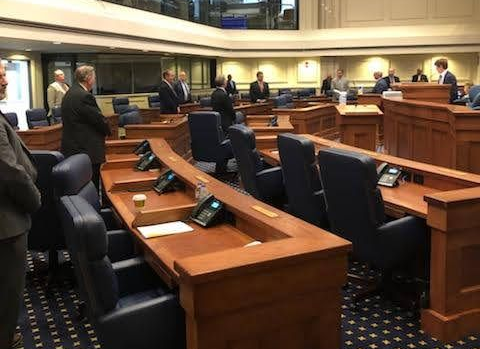On Wednesday, the Senate Judiciary Committee will consider whether or not to advance legislation requiring that the Alabama Ethics Commission share evidence uncovered that would exonerate persons accused of wrongdoing.
Senate Bill 103 is sponsored by State Sen. Arthur Orr.
The legislation is in response to an advisory opinion issued last year by the Alabama Ethics Commission itself stating that the Commission’s investigators do not have to share any exonerating evidence with the attorneys of persons being investigated by the Commission.
Alabama Attorney General Steve Marshall strongly objected to that position. He claimed that that position, which is counter to the rules of evidence in an Alabama courtroom, makes prosecuting any cases referred to the Attorney General’s office by the Commission problematic at best.
The Attorney General’s office has sued the Ethics Commission to force the Commission to overturn the policy. Marshall has gone so far as to argue that any referral to prosecute someone from the Ethics Commission is “worthless” when it is highly possible that either in the trial or later when that conviction is appealed, it becomes known that there was exculpatory evidence already known to the Ethics Commission, but that evidence had been intentionally suppressed by the Ethics Commission or its staff.
“Thus, the respondent can neither be confident that he fully understands the case against him, nor that the exculpatory evidence has been considered by the Ethics Commission before it votes on whether to refer the matter for prosecution or administrative resolution,” the lawsuit states. “In either case, the respondent’s legal defense is impeded.”
According to the synopsis. “This bill would require the State Ethics Commission, before referring a case for prosecution of an alleged ethics or campaign finance violation or before resolving a violation administratively, to provide the person who allegedly violated the law with exculpatory evidence in the possession of the commission.”
Passage of SB103 would mean that the Ethics Commission would have to share any evidence that it finds indicating that the accused may have been innocent of whatever crimes they have been charged with the accused and their attorneys before the Commission issues its judgment as well as before it refers any cases to the attorney general’s office or a district attorney for criminal prosecution.
The Commission’s counsel has argued in court filings that this would “have a chilling effect” on the work of the Commission.
SB103 is one of seven bills being considered by the Senate Judiciary Committee when it meets in Room 325 on Wednesday in the State House.
As of Monday, 471 bills have been filed thus far in the 2023 Alabama Regular Legislative Session.
Wednesday will be day 9 of the regular session. The Alabama Constitution limits the regular session to no more than thirty legislative days during a regular session.
To connect with the author of this story or to comment, email brandonmreporter@gmail.com.
Related
Share via:














